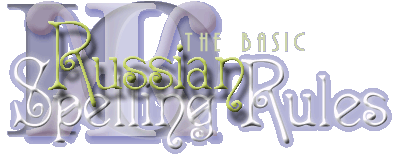 |
| The Russian Spelling System |
| The Russian spelling system is far simpler than that of English. The system is basically this: one sound, one letter; one letter, one sound. There are a few disparities, but only a few. To give you an idea of just how few: they are all just below on this one page. Russian kids learn them by the end of first grade; if you are past this stage, you should pick them up with no difficulty. Right? |
1. Hard and Soft Vowels. Russian has a system of 'soft' or 'palatalized' consonants which parallels that of the regular consonants. (Soft consonants are pronounced as though you were pronouncing that consonant and a 'y' simultaneously.) Fourteen Russian consonants come in soft-hard pairs and, if the Russian alphabet assigned a distinct consonant for each, we would have to memorize fourteen additional consonant letters.
However, because they want their language to remain the simplest language in the world, the Russians decided to use the following vowel to indicate whether the preceding consonant is hard or soft. Since the Russian language has only 5 distinct vowel sounds, this system requires only 5 additional letters. This saves the Russian-language learner 9 letters to memorize! Here are the 10 vowel letters which indicate whether the preceding consonant is 'hard' or 'soft'. Remember, each vowel of the pair is pronounced identically, except for the ы and the и. The approximate pronunciation is given to the right.
| Table I: Russian Vowels | ||
Hard |
Soft |
Sound (roughly) |
| а | я | 'Ah!' |
| э | е | 'Eh?' |
| ы | и | 'Eee!' |
| о | ё | 'Oh!' |
| у | ю | 'Ooo!' |
The vowel letters in the left column occur only after 'hard' consonants; those in the right column appear only after 'soft' consonants.
You must remember that, after applying all the other rules of Russian, especially when adding noun, verb, and adjectives endings, you must be sure to convert any 'hard consonant' vowel to its 'soft' alternate, if the suffix begins with a vowel and is added to a stem ending on a consonant.
Also, if any word ends on a vowel from the right-hand column, then its stem ends on a soft consonant, so when changing the endings on such words, you must consistently use the vowels from the 'soft' column. The following table shows what I mean. [For best results in studying this table, focus on one word at a time and follow the change in each word. Begin with the forms in the left columns; they provide you with the basic vowel used after hard consonants. The right-hand column shows you the rule for converting the basic vowel to the vowel used after a soft consonant.]
| Table II: Vowel Alternations after Soft Consonants | |||
| after hard consonants |
Examples | after soft consonants |
Examples |
| C + а | стол-а | Cь + а > я | |
| C + e | стол-е | Cь + е > е | |
| C + ы | стол-ы | Cь + ы > и | |
| C + о | окн-о | Cь + о > ё | |
| C + у | стол-у | Cь + у > ю | |
"Cь" = any soft consonant in the table above. To compare the use of the 'soft' vowels after soft consonants (Cь) and the 'hard' vowels after hard consonants (C), examine the table below. Женя is the nickname for Евгений "Eugene" or Евгения "Eugenia" and жена means "wife". Table III shows some of them in their various case forms.
| Table III: Hard & Soft Consonants | ||
| Nominative | жена | Женя |
| Genitive | жены | Жени |
| Accusative | жену | Женю |
| Instrumental | женой | Женей |
2. The Combination of й+V (y+vowel) Russian orthography does not allow spellings with й (jod) plus a vowel, that is, й+а, й+э, й+ы, й+о, й+у. Instead, the "soft" vowels are also used to indicate these combinations, as the following table illustrates.
| Table IV: Jod + Vowel Combinations | |||
| стол-а | 'of a table' | 'of a genius' | |
| стол-ы | 'tables' (Pl) | 'geniuses' (Pl) | |
| стол-ом | 'with a table' | 'by the genius' | |
| стол-у | 'to a table' | 'to the genius' | |
In their attempt to simplify their alphabet for us, the Russians developed a spelling system that leaves us another problem: how to indicate the softness of consonants at the end of words or before other consonants, i. e. when no vowel follows. If the consonant is hard--no problem: стол "table". However, if the consonant is soft, a soft sign (ь) must be added to distinguish the soft consonant from its corresponding hard variant, e.g. мать "mother", дверь "door", день "day"; только "only", судьба "fate", просьба "request".
3. The 7 Consonant Rule. Also remember that after к г х (velars) and ш ж щ ч (hushes) never write ы but always и, e.g. студенты "students" but студентки "coeds", лифтёры "elevator operators" but лифтёрши "women elevator operators".
4. The 5 Consonant Rule. After ш ж щ ч ц write o if that syllable is accented and e if it is not, e.g. в большом хорошем доме "in a big nice house". (The light letters indicate accent placement.)
5. The Hush Rule. Finally, after hushes (ш ж щ ч) never write я or ю but always а and у.
 | ||||



